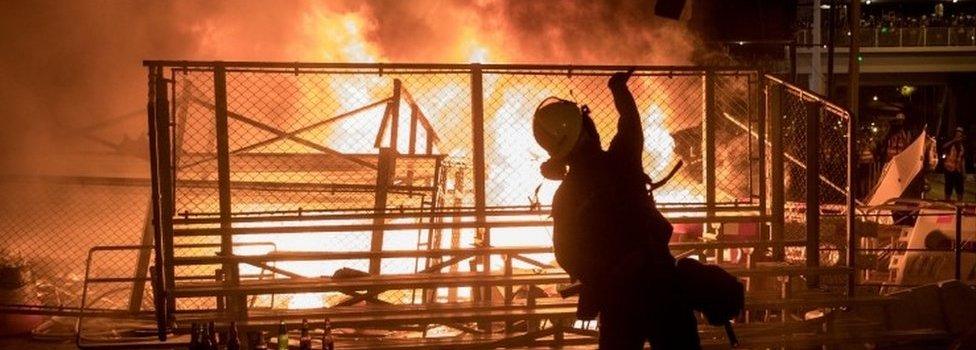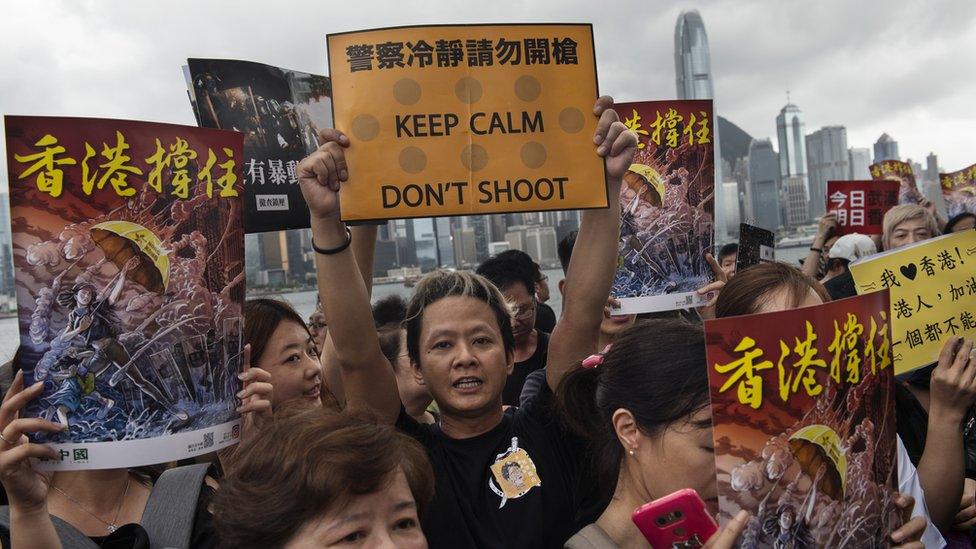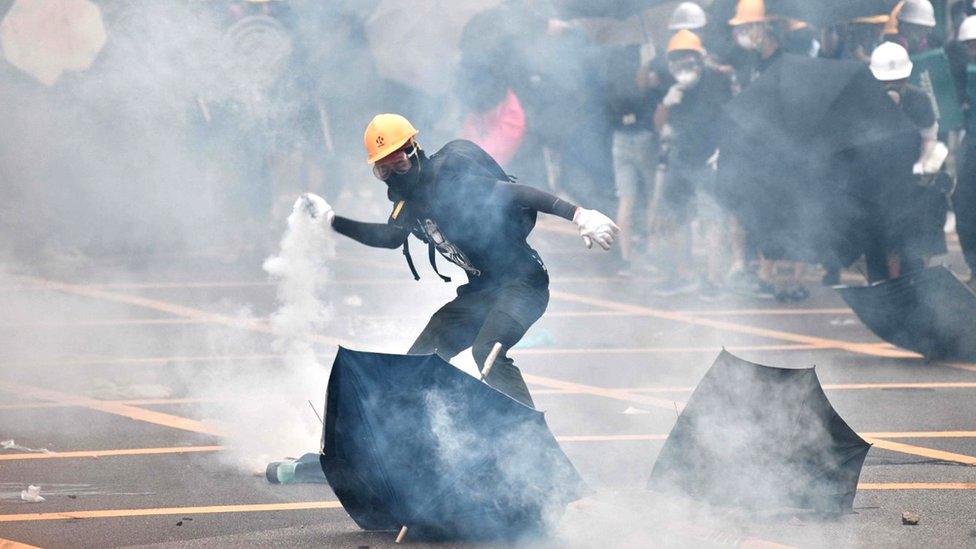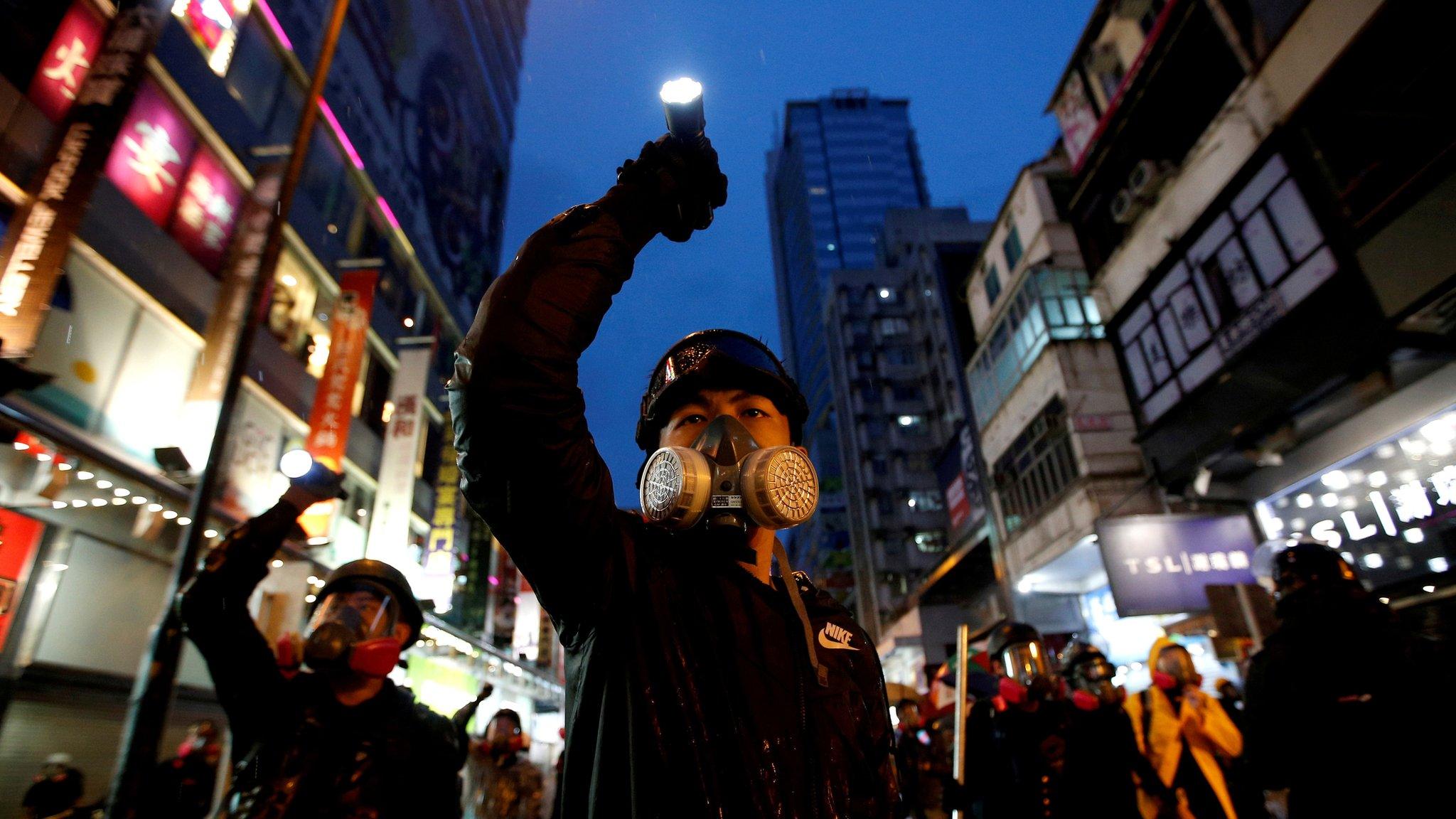Hong Kong leader Carrie Lam to withdraw extradition bill
- Published
Ms Lam announced four steps to help ease tensions - footage courtesy of ICABLE NEWS
Hong Kong leader Carrie Lam has said she will withdraw the highly controversial extradition bill which has triggered months of protests.
The proposal, introduced in April, would have allowed criminal suspects to be extradited to mainland China.
The bill was suspended in June but Ms Lam stopped short of scrapping it.
Full withdrawal was one of five key demands of protesters, who also want full democracy. Some rejected Ms Lam's move and vowed to keep on protesting.
In a televised address on Wednesday, Ms Lam also announced other measures that appeared to be designed to soothe unrest.
She said two senior officials would join an existing inquiry into police conduct during the protests. An independent investigation into alleged police brutality against protesters is another of the activists' key demands.
On Monday, Ms Lam was heard on leaked audio tapes blaming herself for igniting Hong Kong's political crisis, and saying it was unforgiveable of her to have caused such huge havoc.
The extradition bill quickly drew criticism after being unveiled in April. Opponents said it would undermine Hong Kong's legal freedoms and might be used to intimidate or silence critics of Beijing.
Hong Kong is now in its 14th successive week of demonstrations, and saw fresh violence between police and activists last weekend.
What did Carrie Lam say?
In her pre-recorded message Ms Lam said the government would "formally withdraw the bill in order to fully allay public concerns".
She said the protests had "shocked and saddened the Hong Kong people" and the violence was "pushing Hong Kong towards a highly dangerous situation".
"No matter what discontentment the people have towards the government or the society, violence is not the way to resolve problems," she said.
"Currently, stopping the violence is the top priority, maintaining the law and rebuilding the rules of society. The government will sternly tackle violence and illegal action."
Ms Lam said she and other senior officials would visit communities in Hong Kong and talk to people directly about their concerns.
What reaction has there been?
Pro-Beijing lawmaker Regina Ip told BBC Chinese the latest move was "a positive step forward".
"It won't pacify everybody but hopefully it would clear remaining doubt in the minds of some of the peaceful protesters," she said.
"The protests have been driven by a multitude of reasons including deep-rooted anger about Hong Kong's widening wealth gap, housing conditions and political system. I am glad that the chief executive said that she would go to the district to enter direct dialogue with the people from all walks of life."
Students have boycotted classes as protests continue into their 14th week
Pro-democracy politician Wu Chi-Wai, however, dismissed Carrie Lam's compromises as "fake".
"We must stop police brutality. Otherwise the protests will keep going," he said.
Ahead of Ms Lam's announcement, leading pro-democracy activist Joshua Wong said the withdrawal of the bill would be "too little too late".
In a series of tweets he said all the protesters' demands had to be met.
Allow X content?
This article contains content provided by X. We ask for your permission before anything is loaded, as they may be using cookies and other technologies. You may want to read X’s cookie policy, external and privacy policy, external before accepting. To view this content choose ‘accept and continue’.

Fellow pro-democracy activist Nathan Law told the BBC that their campaign would go on.
"The movement has evolved into a movement that fights for autonomy, democracy and also preserving our way of life and restricting the excessive power of the police. So I think the protest will continue based on that," he said.
Amnesty International said that although the withdrawal of the bill was welcome, an independent investigation into "unnecessary and excessive use of force by police" was needed "more than ever".
Demonstrators want amnesty for all those arrested, greater political reforms and for officials to stop describing the protests as riots.
Hong Kong was handed back to China in 1997 after more than 150 years of British rule. It has remained semi-autonomous under a "one country, two systems" principle but some fear China is seeking greater control.

Will concessions be enough to stop protests?
Analysis by Stephen McDonell, BBC News, Hong Kong
By her own reckoning, Hong Kong's chief executive has created "unforgivable havoc" by bungling the response to broad public opposition to her proposal.
Finally, she is officially withdrawing the bill.
There had been widespread speculation that Carrie Lam did not have the authority to adhere to this or any of the protesters' demands because Beijing has really been calling the shots.
It is possible that she has been given the green light to pull the bill to try to show that Hong Kong's autonomous decision-making is still intact.
But the longer it has taken for the extradition bill debate to be resolved, the wider the demands from activists have become. Many demonstrators now say they will not stop holding rallies without a genuinely independent inquiry into the Hong Kong police force and universal suffrage in this region.

What is the bill about?
Opponents said allowing criminal suspects to be extradited to mainland China would undermine the city's judicial independence and risked exposing Hong Kongers to unfair trials and violent treatment.
They also argued the bill would give China greater influence over Hong Kong and could be used to target activists and journalists.
Opposition was widespread from the start with groups from all sections of society voicing their criticism.
Several countries also expressed concern. In response, China's foreign ministry accused them of interference in China's internal affairs.

A guide to the Hong Kong protests

Summary of the protests in 100 and 500 words
All the context you need on the protests
Timeline of events so far
The background to the protests in video
More on Hong Kong's history
Profile of Hong Kong leader Carrie Lam
- Published28 November 2019

- Published4 September 2019

- Published21 May 2020
